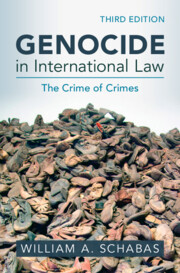5 results
Introduction
-
- Book:
- Genocide in International Law
- Published online:
- 14 March 2025
- Print publication:
- 03 April 2025, pp 1-13
-
- Chapter
- Export citation
1 - Origins of the Legal Prohibition of Genocide
-
- Book:
- Genocide in International Law
- Published online:
- 14 March 2025
- Print publication:
- 03 April 2025, pp 14-42
-
- Chapter
- Export citation

Genocide in International Law
- The Crime of Crimes
-
- Published online:
- 14 March 2025
- Print publication:
- 03 April 2025
Introduction
-
- Book:
- In the Shadow of the Holocaust
- Published online:
- 23 December 2021
- Print publication:
- 06 January 2022, pp 1-15
-
- Chapter
- Export citation
11 - The Complex Life of Rafal Lemkin
-
-
- Book:
- The Dawn of a Discipline
- Published online:
- 04 September 2020
- Print publication:
- 24 September 2020, pp 280-305
-
- Chapter
- Export citation

